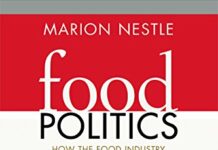
Ebook Info
- Published: 2012
- Number of pages: 301 pages
- Format: PDF
- File Size: 2.38 MB
- Authors: Marion Nestle
Description
Calories—too few or too many—are the source of health problems affecting billions of people in today’s globalized world. Although calories are essential to human health and survival, they cannot be seen, smelled, or tasted. They are also hard to understand. In Why Calories Count, Marion Nestle and Malden Nesheim explain in clear and accessible language what calories are and how they work, both biologically and politically. As they take readers through the issues that are fundamental to our understanding of diet and food, weight gain, loss, and obesity, Nestle and Nesheim sort through a great deal of the misinformation put forth by food manufacturers and diet program promoters. They elucidate the political stakes and show how federal and corporate policies have come together to create an “eat more” environment. Finally, having armed readers with the necessary information to interpret food labels, evaluate diet claims, and understand evidence as presented in popular media, the authors offer some candid advice: Get organized. Eat less. Eat better. Move more. Get political.
User’s Reviews
Reviews from Amazon users which were colected at the time this book was published on the website:
⭐I was prepared to spend most of my time skimming this book for useful information while avoiding the boring parts that often encumber these kinds of texts, but I read this one cover to cover in just a few days. In fact, as I was reading it and nearing the end I tweeted:”Sad that I’m almost done reading ‘Why Calories Count.’ It’s so good that I don’t want it to end. Really.” (@weighthacker)That’s because Why Calories Count is the fascinating story of what calories are, how they were discovered, how they’re measured (my favorite way: using ‘double labeled water’ calorimeters), how our bodies use them, why they’re important to us, how they affect our weight, and how our society views them. If you’re at all interested in the calorie, I don’t think you’ll find a better book.What I especially appreciate about Marion Nestle and Malden Nesheim’s approach is that they don’t (ahem) sugar coat anything. When information about certain aspects of calories is unclear, they say that. If there are conflicting points of view on a topic, they raise them. If food companies are employing deceitful practices (they are), they’re pointed out. They also explain how the regulations around calories came into being and how politics often plays more of a role than science when it comes to our nutrition labels. It’s not as dry as it sounds.All of the information is put into the context of why we’re experiencing record levels of obesity and being overweight, and what we can actually do about it. This isn’t a diet book, but it does look at many of the popular diets out there and explains why they work and which one is for you. (Why: You eat fewer calories. Which One: Any one that helps you eat fewer calories.) If you’re trying to lose weight or know someone who is, this is a must read.
⭐The book is easy enough to read. But what puzzled me throughout was: who was the book written for? There is much that is very basic, indeed elementary for people who have any basic understanding of nutrition. (The addition of the names of people who initially formulated various concepts does not change that; it’s mere detail, not something that enhances or deepens the exegesis.)But then there are some more complicated, more technical discussions, e.g., about the difference between Atwater’s available (or metabolizable) energy and Livesey’s net metabolizable energy. Lay readers are not likely really to grasp the (conceptual) difference; and after several pages of trying to outline it, the authors admit that it really doesn’t matter. What’s the point of discussing it, then, and going on for several pages? Or for doing so in a venue that is, by and large, so untechnical?I am a fan of much of Marion Nestle’s work. FOOD POLITICS and FOOD SAFETY are terrific books. WHAT TO EAT is good. (The petfood book: not so much.) But I regret having bought this one, and will donate it to the local library or high school. There’s just not much there there, at least for people who know much of anything about diet, nutrition, or the machinations of the food industry.
⭐The best part about the book is that is a well written summary of orthodox “establishment correct” thoughts and concepts about calories. It is just what you would expect from a bureaucrat.He tells us that calories are measured by how much they give off when burned. But as Timothy Ferris points out in his book, by this thinking we can all get fat from eating fireplace logs! Ferris and others have amply demonstrated that weight gain and loss can be heavily influenced by not only the calorie count, but paying attention to where the calories are coming from.Another small example should illustrate the pathetic level of establishment understanding of the absorption of calories. In the 1960’s, Time-Life published a remarkable science series that I have now been rereading. In it they mention an experiment designed to determine how much of the earth a tree consumes when it goes from seed to, say, 10 feet tall. Would you believe about 2 ounces of dirt! The rest comes from inhaled carbon and other stuff processed from the air during photosynthesis.Back to humans. There is an awful lot of oxygen in our body’s hydrocarbons that must come from the air and water we drink. Although these contribute zero “establishment” calories, they have mass and are currently stuck to your ass in large gobs. Could this explain why weight gain and loss appears to merely coincide with our calorie intake?I only ask that you remember that you saw this here first.
⭐The great strength of Why Calories Count is that it takes a topic that is so widely discussed, yet little understood, and tackles it a calm but authoritative way. It draws upon considerable science and research, then simplifies the concepts to help readers make decisions that are “good enough” for everyday life–the book’s central, recurring theme.This is not a diet book. You won’t find a list of “flat belly foods” or any “revolutionary” new breakthroughs in weight management. Nor is it a quick read for a day at the beach. The reading level is moderate-plus, owing mainly to the scientific and technical content, and not the authors’ relatable delivery of it. In fact, it will probably be used as a textbook in the not-too-distant future. But unlike a college student, I certainly plan to hang on to this book and keep it handy for reference later.The book begins with units of measure and rules of physics, and moves into some of the more arcane history of calorie research, before getting into things like nutrition labels and popular diet claims. It’s an extremely refreshing read, in that it doesn’t rely on gimmicks and assumptions, and doesn’t try to make topics like metabolism and glucose sexy when, frankly, they aren’t. But for someone truly interested in learning more about how calories work in the body (and how they’re regulated by government), it’s an indispensable text.
⭐This is a book that makes sense. No nonsense, just plain facts. We hear so much about diets that leave out particular macronutrients. But the only advice that comes out of this book at the end, is the most important. Make every calorie you consume, nutritious. Calories count. I have learnt a lot about the history of how calories were discovered and how we are consuming far too many of them by reading this.
Keywords
Free Download Why Calories Count: From Science to Politics (California Studies in Food and Culture Book 33) 1st Edition in PDF format
Why Calories Count: From Science to Politics (California Studies in Food and Culture Book 33) 1st Edition PDF Free Download
Download Why Calories Count: From Science to Politics (California Studies in Food and Culture Book 33) 1st Edition 2012 PDF Free
Why Calories Count: From Science to Politics (California Studies in Food and Culture Book 33) 1st Edition 2012 PDF Free Download
Download Why Calories Count: From Science to Politics (California Studies in Food and Culture Book 33) 1st Edition PDF
Free Download Ebook Why Calories Count: From Science to Politics (California Studies in Food and Culture Book 33) 1st Edition

